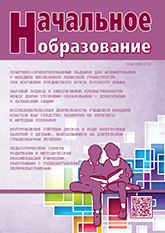The article discusses the problem of creating of health culture in the first stage of systematic school that determined by the provisions of the Federal state educational standard of the second generation. The features of the process of formation of the valuable relation to the “health” concept at the elementary school students are considered, taking into account the difficulties caused by age-related characteristics of the children in this age group. The article expands an integrative approach to the formation of the younger students healthy and safe way of life based on the content of the contribution of different subjects of primary school education program.
health culture, Federal state educational standard of primary education, age characteristics of younger students, integrative contribution to the content of different subjects primary education in the formation of the valuable relation to the “health” concept, the rules of a healthy and safe lifestyle
Стратегическим направлением образовательной политики современной России является формирование здоровой личности, осуществляемое на всех ступенях образования. Важнейшая из этих ступеней – начальное общее образование, что нашло отражение в Федеральных государственных образовательных стандартах начального общего образования (ФГОС НОО) нового поколения, где обозначена цель: формирование личности, выполняющей правила здорового и безопасного для себя и окружающих образа жизни, как условие ее развития и социализации. Решение данной образовательной задачи важно не только для личного благополучия человека, но и сохранения национальной, в том числе экономической, безопасности страны.
ПРОБЛЕМЫ И ТРУДНОСТИ В ФОРМИРОВАНИИ КУЛЬТУРЫ ЗДОРОВЬЯ У ДЕТЕЙ МЛАДШЕГО ШКОЛЬНОГО ВОЗРАСТА
Пристальное внимание к проблеме здоровья обучающихся на этапе начальной школы во многом обусловлено их возрастными психофизиологическими особенностями, а также социально-демографическими показателями. Например, на протяжении полутора десятков лет фиксируется отставание нашей школы в привитии учащимся культуры здорового и безопасного образа жизни на основе способности овладевать научными знаниями и использования их в процессе жизни. Яркое свидетельство тому – рост заболеваемости детей и молодежи.
1. Andreeva I.G. Znaniya o zdorov’e i ikh mesto v soderzhanii obrazovaniya [Knowledge about health and their place in the content of education]. Standarty i monitoring v obrazovanii [Standards and monitoring in education]. 2012, I. 1, pp. 12-17. EDN: https://elibrary.ru/OPQLKD
2. Andreeva I.G. Vospitatel’nyy potentsial estestvenno-nauchnogo obrazovaniya [Educational potential of science education]. Pedagogika [Pedagogics]. 2015, I. 8, pp. 10-15.
3. Vinogradova N.F. Soderzhanie obrazovaniya v nachal’noy shkole kak sredstvo priobshcheniya mladshikh shkol’nikov k kul’turnomu opytu chelovechestva [The content of education in primary school as a means of introducing younger students to the cultural experience of mankind]. Moscow, St. Petersburg, NestorIstoriya Publ., 2011. 235 p.
4. Federal’nyy gosudarstvennyy obrazovatel’nyy standart nachal’nogo obshchego obrazovaniya [Federal state educational standard of primary General education]. Moscow, Prosveshchenie Publ., 2011. 32 p.






